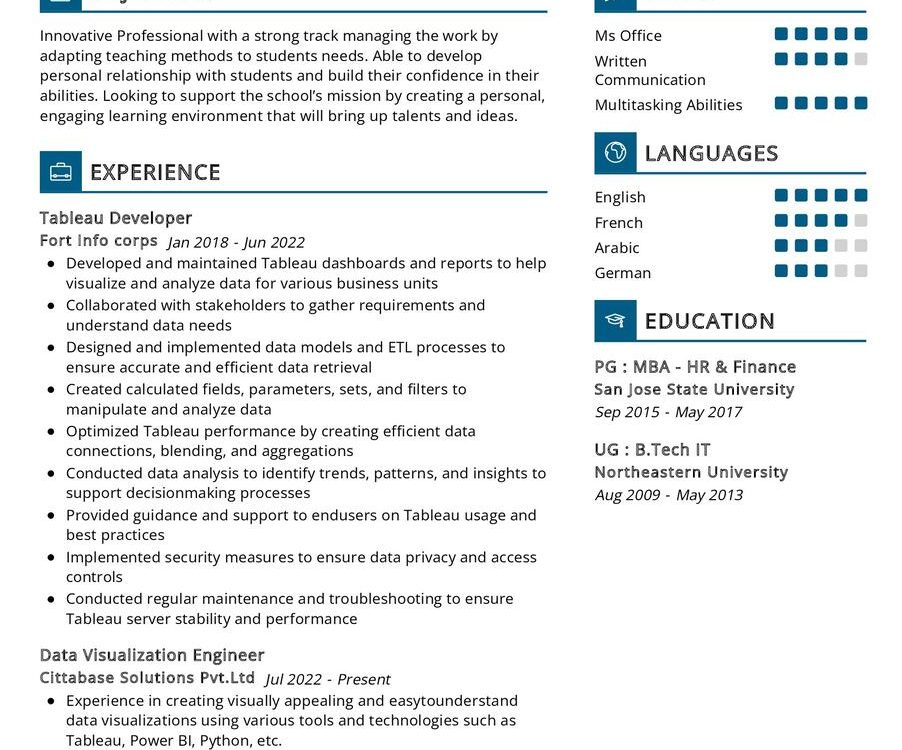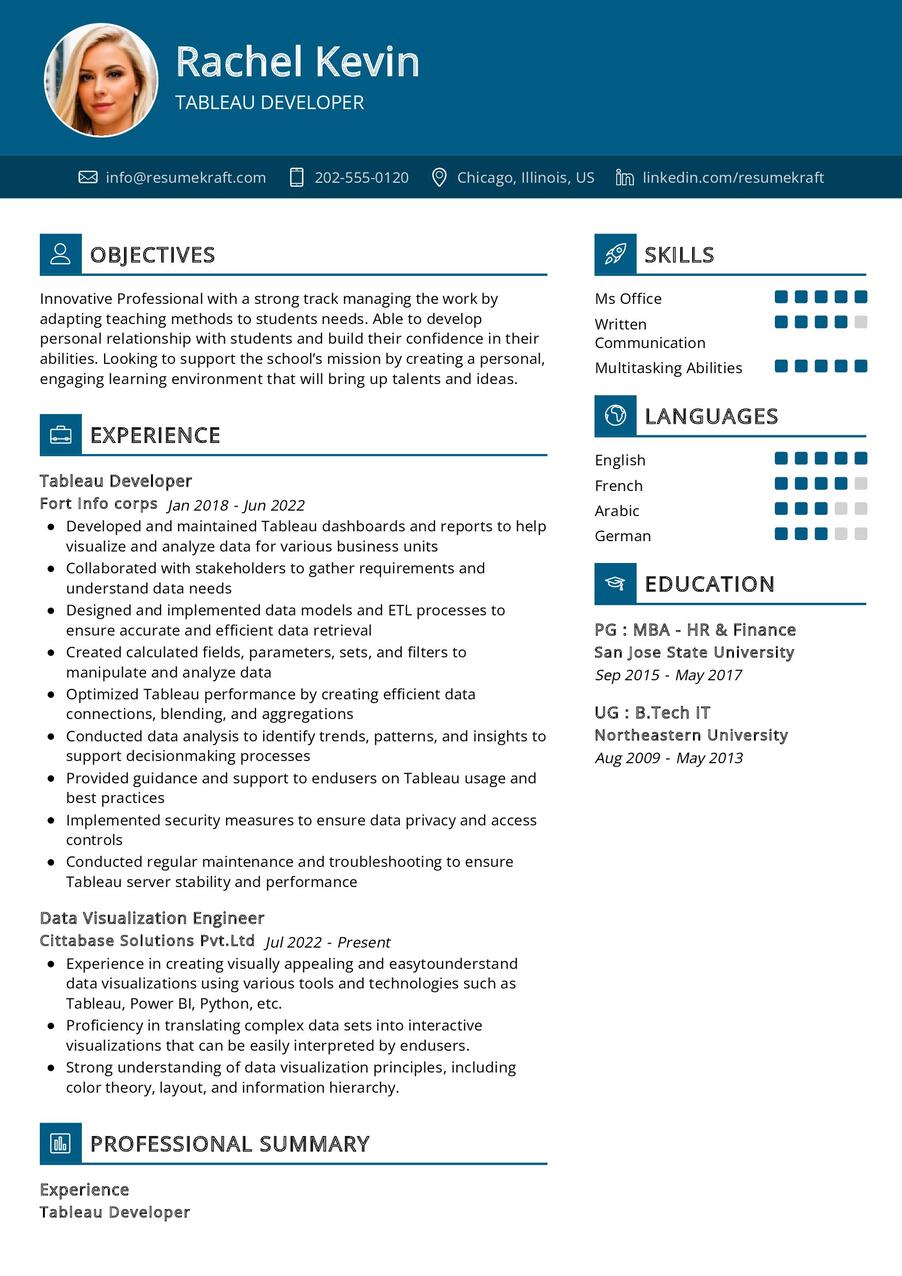Exploring the Role of a Tableau Developer
In today’s data-driven world, the role of a Tableau Developer has emerged as a crucial player in helping organizations make sense of their data. This article delves into the multifaceted responsibilities of a Tableau Developer, highlighting the technical expertise and strategic vision required for success in this dynamic field.
Key Responsibilities of a Tableau Developer
The position of a Tableau Developer comes with a unique set of responsibilities, blending technical skills with a creative flair for data visualization. Let’s explore the key duties that define the role:
- Designing and developing interactive and insightful dashboards using Tableau, translating complex data sets into visually appealing and easy-to-understand graphics.
- Collaborating with stakeholders to gather requirements and understanding the business needs for effective data visualization solutions.
- Creating and maintaining an organized and efficient data infrastructure, ensuring seamless integration with Tableau.
- Optimizing Tableau performance by identifying and resolving issues, ensuring a smooth and efficient data visualization process.
- Providing training and support to end-users, fostering a culture of data-driven decision-making within the organization.
- Staying updated on the latest trends and advancements in Tableau and data visualization techniques, incorporating best practices into projects.
Each responsibility contributes to the overarching goal of transforming raw data into actionable insights for informed decision-making.
Tableau Developer Job Requirements
Becoming a proficient Tableau Developer requires a combination of education, technical skills, and practical experience. Here are the essential requirements for aspiring Tableau Developers:
- A degree in Computer Science, Information Technology, or a related field, providing a solid foundation in data analysis and visualization.
- Proficiency in Tableau Desktop and Tableau Server, with a deep understanding of data visualization principles.
- Experience in SQL and database management, crucial for extracting and organizing data for Tableau.
- Strong analytical and problem-solving skills, enabling the interpretation of complex data sets.
- Effective communication skills to collaborate with non-technical stakeholders and translate business needs into actionable insights.
- Certifications in Tableau, showcasing a commitment to continuous learning and staying current in the field.
Meeting these requirements is a journey towards mastering the art and science of Tableau development.
Crafting an Effective Tableau Developer Resume
As you embark on the journey to create a compelling Tableau Developer resume, consider these tips to showcase your skills and experience effectively:
- Highlight specific projects where you successfully implemented Tableau solutions, detailing the impact on decision-making processes.
- Showcase your ability to work with diverse datasets and your expertise in creating visually appealing dashboards.
- Quantify your achievements, using metrics to demonstrate the success of your Tableau projects.
- List any additional relevant skills, such as knowledge of other data visualization tools or programming languages.
- Customize your resume for each application, aligning your skills with the specific requirements of the job.
Your Tableau Developer resume is your professional story, narrating your expertise and achievements in the realm of data visualization.
Tableau Developer Resume Summary Examples
Your resume summary is the gateway to your professional narrative. Craft a powerful summary that encapsulates your Tableau journey:
- “Tableau Developer with a proven track record of transforming complex data into actionable insights. Skilled in creating visually stunning dashboards that drive informed decision-making.”
- “Detail-oriented Tableau Developer with expertise in optimizing data visualization processes. Adept at collaborating with cross-functional teams to meet organizational goals.”
- “Experienced Tableau Developer with a passion for translating business needs into compelling visual stories. Committed to staying at the forefront of data visualization trends.”
Your summary sets the tone for your resume, offering a snapshot of your Tableau expertise and professional journey.
Building Your Tableau Developer Experience Section
Your experience section is the heart of your resume, detailing your journey as a Tableau Developer. Use this space to highlight your achievements and contributions:
- Lead Tableau Developer at XYZ Corporation, where I implemented a dynamic dashboard that resulted in a 25% increase in data accessibility.
- Collaborated with the marketing team to create a real-time sales performance dashboard, contributing to a 15% improvement in sales strategies.
- Successfully managed a Tableau Server migration project, ensuring minimal downtime and a seamless transition for end-users.
Each experience entry adds depth to your Tableau Developer story, showcasing your impact and expertise.
Educational Background for Tableau Developers
Your educational journey is a crucial aspect of your Tableau Developer story. Highlight your academic achievements and relevant certifications:
- Master of Science in Computer Science, ABC University, 2017.
- Bachelor of Technology in Information Technology, XYZ Institute of Technology, 2015.
- Tableau Desktop Specialist Certification, Tableau, 2018.
Each educational milestone contributes to your expertise as a Tableau Developer, showcasing your commitment to continuous learning.
Tableau Developer Skills for Your Resume
Your skill set as a Tableau Developer is a powerful toolkit. Highlight both technical and soft skills that contribute to your success:
Technical Skills:
- Proficiency in Tableau Desktop and Tableau Server.
- SQL and database management skills for efficient data extraction.
- Knowledge of other data visualization tools, enhancing your versatility.
- Programming skills, such as Python or R, for advanced data manipulation.
Soft Skills:
- Effective communication and collaboration with non-technical stakeholders.
- Attention to detail in creating visually appealing and accurate dashboards.
- Analytical and problem-solving abilities for interpreting complex data sets.
- Adaptability to stay current with evolving data visualization trends.
Each skill in your toolkit contributes to your effectiveness as a Tableau Developer.
Common Mistakes to Avoid in Your Tableau Developer Resume
As you craft your Tableau Developer resume, steer clear of common pitfalls that can impact your chances of landing the ideal job:
- Avoid using generic terms; tailor your resume to highlight Tableau-specific achievements and skills.
- Ensure that your resume is achievement-oriented, emphasizing the impact of your Tableau projects.
- Include a cover letter to provide additional context to your Tableau Developer story.
- Avoid technical jargon overload; keep your resume accessible to both technical and non-technical audiences.
- Thoroughly proofread your resume to maintain a professional image.
Avoiding these mistakes ensures your Tableau Developer resume is a true reflection of your skills and accomplishments.
Key Takeaways for Your Tableau Developer Resume
As you conclude crafting your Tableau Developer resume, remember these key takeaways to make it stand out:
- Highlight your unique Tableau projects and their impact on business outcomes.
- Showcase your technical proficiency in Tableau and related skills.
- Detail strategic initiatives you’ve led, demonstrating your visionary approach to data visualization.
- Include a section on continuous learning, highlighting relevant certifications and courses.
With these insights, you are well-equipped to craft a Tableau Developer resume that tells your story of growth, learning, and success.
Finally, feel free to utilize resources like AI Resume Builder, Resume Design, Resume Samples, Resume Examples, Resume Skills, Resume Help, Resume Synonyms, and Job Responsibilities to create a standout application and prepare for the Tableau Developer job interview questions.


